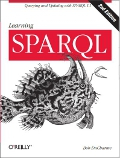
51 weeks ago at last year's semtech I couldn't believe that there was still no book about SPARQL available. I had accumulated notes for such a book, and by that point I'd learned enough about SPARQL as a TopQuadrant employee that I decided to start studying the specifications (and especialy the 1.1 update) more systematically and write the book myself. (This explains why I've been writing less on my blog in the last year and writing about SPARQL more when I do.)
I'm proud to announce that I'm publishing the book with O'Reilly. Print and electronic versions will be available in July at the latest, and we're already planning on releasing an expanded edition with additional new material and any necessary updates once SPARQL 1.1 becomes a Recommendation. Anyone who buys the ebook version of the first edition will get the expanded edition on SPARQL 1.1 at no extra cost.
As you can tell from the book's cover on the right, the O'Reilly animal for this one is the anglerfish—the one with the light that hangs off the front of its head, for the pun on "sparkle". (I should really pick up the nightlight version of this lovely fish.)
From what I've seen so far, the only coverage of SPARQL in any existing books is a chapter or two in more general books on the semantic web, and I haven't seen any coverage of SPARQL 1.1 in those books just yet. (The second edition of of Dean Allemang and Jim Hendler's Semantic Web for the Working Ontologist, which is available on Amazon today, covers some SPARQL 1.1 query features, but not SPARQL Update.) "Learning SPARQL" is the first complete book on SPARQL, and covers both 1.0 and 1.1—including SPARQL Update—with working sample queries and data that you can try yourself with free software.
I parked the domain name learningsparql.com some time ago, and now there's a full web site about the book there. For up-to-date information about the book's availability and SPARQL news in general, subscribe to the twitter feed @LearningSPARQL.

